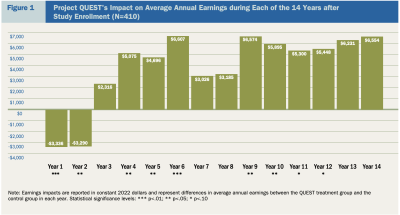Randomized Controlled Trial (RCT) of...
Project QUEST Job Training for Low-income Adults
Reviewed
Mobility posted (October 2024) long-term RCT results for Project QUEST's occupational training of low-income adults for well-paying healthcare jobs. This high-quality RCT found a 15-20% gain in annual earnings at the 14 year follow-up - an extremely promising (albeit not quite definitive) result.
Project QUEST, founded in San Antonio, Texas, in 1992, provides financial, academic, and personal supports to help adults with low incomes obtain postsecondary education credentials needed to access well-paying jobs in strong sectors of the local economy. Economic Mobility Corporation (Mobility) conducted a randomized controlled trial (RCT) study of Project QUEST to assess its impacts on credential attainment and earnings among individuals pursuing health-care careers. We previously reported that Project QUEST had large, positive impacts on participants’ credential attainment and earnings during the 11 years after study enrollment. With financial support from Ascendium Education Group, we worked with the Ray Marshall Center at the University of Texas at Austin to examine whether the program’s impacts continued to be sustained 14 years after study enrollment, using state administrative data on earnings and National Student Clearinghouse (NSC) data on postsecondary education outcomes.
In this report, we present findings on Project QUEST’s impacts, describe the Project QUEST model and participants’ experiences, compare the program’s benefits and costs, and discuss the implications of the findings for policy and programming. Key findings follow.
• Over the entire 14-year follow-up period, QUEST participants earned an average of $54,280 more than control group members––a statistically significant 13.5 percent increase.
• The program's earnings impact averaged $5,300 per year from years four through 14 after study enrollment, when most QUEST participants had completed their education. Variation in earnings has increased over time, causing the differences in years 13 and 14 to fall just short of standard levels of statistical significance. However on the whole, the evidence shows that Project QUEST had large, lasting impacts on participants’ earnings.
• Project QUEST increased postsecondary credential attainment by 14.3 percentage points and more than doubled the attainment of health-care credentials over the 14-year period.
• The earnings gains that QUEST participants experienced far exceeded the costs of the program and participants’ college attendance.
We have no suggested revisions to the published summary.
No-Spin’s Study Overview
High-quality RCT of Project QUEST's occupational training of low-income adults for well-paying healthcare jobs finds a 15-20% gain in annual earnings at the 14 year follow-up - an extremely promising (albeit not quite definitive) result.
Program and Study Design:
- QUEST, located in San Antonio, "provides financial, academic, and personal supports to help adults with low incomes obtain postsecondary educational credentials needed to access well-paying jobs in strong sectors of the local economy." Its cost is ~$14,400 per participant.
- The RCT assessed QUEST's impact among a sample of 410 low-income adults pursuing health-care careers (88% female, 74% Hispanic, avg baseline earnings of $15,298). Based on careful review, this was a high-quality RCT (e.g., good baseline balance, negligible sample attrition).
Findings:
- The study found that QUEST increased annual earnings by 15-20% (approximately $6,000 per year) during years 9-14 after program entry (see chart below). The cumulative earnings gain far exceeds the program's cost. These sustained gains represent meaningful improvement in people's life outcomes.

- We offer two cautions on these findings:
- The effects were statistically significant or near significant in years 9-12 but not after - possibly because sample members' earnings are more dispersed (i.e. have greater "variance") over time, making it harder to detect an effect as significant.
- Additionally, this was a modest-sized study conducted in a single site (San Antonio).
Comment:
- For the above reasons, replication of these highly-promising results in another RCT at a different site would be important to hopefully confirm the findings and establish that they generalize to other communities.
- Disclosure: Arnold Ventures, which funds the No-Spin Evidence Review, funded two of the earlier follow-ups of the QUEST RCT (at the 9- and 11-year mark).
Click or tap a highlight to see No-Spin’s comment